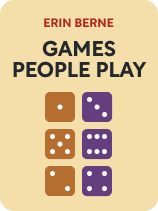

This article is an excerpt from the Shortform book guide to "Games People Play" by Eric Berne. Shortform has the world's best summaries and analyses of books you should be reading.
Like this article? Sign up for a free trial here .
How does childhood conditioning shape our behavior in adulthood? Is it possible to shake off the weight of early conditioning?
Childhood conditioning often weighs on people even in their adult years. This conditioning may leave some adults feeling like they don’t have the power to make their own choices in life. Luckily, this is a behavior growth obstacle that can be overcome.
Here are four steps for developing autonomy in adults, according to psychiatrist Eric Berne.
Achieving Personal Sovereignty
Despite the weight of our parental and cultural conditioning, it’s fully possible to develop autonomy in adults. Berne argues that because we have these capacities as children, we can always recover them. As children, we each decide how we’ll adapt to the influences of our parents and culture. Because this was (at some point) a conscious decision, Berne says, we can find it and reverse it.
For example, you may have had a parent who tried to determine your career path at a young age. Maybe they insisted you follow in their footsteps, or maybe that you become a doctor, lawyer, or engineer. That pressure inhibited your ability to choose for yourself, but you can return and undo the negative effects it had.
While Berne doesn’t say specifically how to undertake the necessary psychological and behavioral growth, he does give a sketch of the process. It’s possible, despite being a continual fight to overcome your prior conditioning. Below, we’ve distilled his recommendations into four steps.
Step #1: Overcome parental influences. First you have to identify and throw off the influence of culture and tradition. Often, the expectations of parents and society inhibit us from expressing who we really are. Consider modern-day Mormons, where children are born into a deeply traditional environment. A child who wants real autonomy needs to overcome the heavy influence of this immediate cultural background.
(Shortform note: In fact, Pew Research reports that 36% of Mormon-born people leave the faith, showing that it’s possible to overcome cultural conditioning. But Berne doesn’t address the counterargument: Oftentimes, strong community and meaningful connection to cultural roots are beneficial to personal well-being. Community connections can provide support when you’re struggling, give you purpose in the larger collective, and often share your values and beliefs. Berne is right that it’s important to seek a strong personal identity—if you don’t, you may experience low self-esteem, lack direction, and struggle to set boundaries—but that individuation shouldn’t cut you off entirely from community support.)
Step #2: Shake off the expectations of others. Berne doesn’t go into detail here, but we can infer that people who aren’t trying to transcend their games weigh you down. So after addressing your cultural conditioning, shed the expectations of your immediate friends and acquaintances. Often, friends who don’t grow with you serve only to hinder your development.
For example, say you have a friend who’s always trash-talking her boss. She wants validation and encouragement, but giving it to her keeps you at that level. To grow beyond your own games, you need to stop playing both yours and hers.
| Social Circles Exert a “Network Effect,” Influencing Your Choices In contemporary self-help culture, it’s now a common notion that we need to leave behind people who don’t grow with us. Oftentimes, close friends can enable your bad habits, like drinking or being negative, because they do them too. Or as Berne would say, they enable you to keep playing your games. Author and entrepreneur Jim Rohn famously said, “You are the average of the five people you spend the most time with.” In other words, the people around us exert a large influence on who we become. And in fact, it’s not just the closest five: Research has found that second-degree (friend of a friend) and third-degree (friend of a friend of a friend) social connections influence the spread of obesity, though the strength of that influence diminishes the more distant the connection is. This “network effect” may also affect behavior related to work, health, and educational choices. Further, this study argues that network effects may account for increasing social inequality. When members of a given social network adopt an advantageous behavior, like regular exercise, it spreads via the network effect. This creates a positive feedback loop: As more network members adopt it, the easier it is for others to join in. While good for that network, this also widens the gap between them and other networks that lack the advantageous behavior. This sheds light on privilege: Those who start in a healthy, successful social network have a better chance of finding health and success than those born into social networks characterized by poor health and low socioeconomic mobility. From Berne’s point of view, we could say that your network influences your games—and as we explained earlier, your games determine how you use the opportunities that come your way. If you inherit unhealthy, ineffective social habits from an unhealthy network, you’re at a disadvantage from the get-go. Berne’s advice, then, may help: Identify relationships that are holding you back, and lessen those connections (thereby lessening their influence on you via the network effect.) |
Step #3: Stop indulging in your games. Games provide us easy but ultimately unfulfilling rewards. They’re more analogous to a chocolate bar than a soul-warming bowl of soup; you won’t grow healthy on games alone. Once you notice that you’re indulging in some self-validating behavior, it’s time to let go of that shallow gratification.
For example, it’s far easier to argue than it is to communicate productively. Argument lets us feel right for little effort, whereas effective communication is more difficult but more rewarding. To stop this, notice that you’re probably arguing to validate your emotions (and not for any rational purpose), and give up that indulgence.
(Shortform note: Opinions are split on indulgence. As a long-term habit, it can be destructive, as with drug or alcohol abuse, gambling, and so on. Yet other researchers have found that some indulgence is a good thing: If we’re always worried about control, plans, and the future, we can’t enjoy worry-free pleasures in the present moment. Consider also the phenomenon of dopamine fasting, where abstaining from pleasure-giving activities supposedly “resets” your brain, defeating your indulgent habits. But you can take this too far, as some did—they removed any and all pleasure from life, including social contact, delicious food, and eye contact. As Anna Lembke argues in Dopamine Nation, pleasure requires balance: We deserve to enjoy our lives, but excessive stimulation, like from a Tik Tok feed or porn, desensitizes you and reduces your ability to take pleasure in day-to-day living.)
Step #4: Develop your self-control. After the first three steps, shift toward developing control over your repertoire of behaviors. In other words, develop habits that reflect who you really are, and practice making only the choices that align with that. When you think, feel, and act how you genuinely want to, Berne argues, you can develop authentic relationships that transcend the influence of games.
(Shortform note: Here again, it seems like mindfulness would’ve been of great value to Berne’s theories. Practicing mindfulness helps us move from reactivity to response-ability, so it would theoretically help us to notice and disengage from those habits. We cover basic techniques in our guide to Mindfulness in Plain English, many of which complement Berne’s pattern-breaking method: For example, meditation develops your capacity to allow emotions and urges to pass without letting them control you. You could then use that skill to regulate your emotions when you start getting caught up in a game, and thereby maintain adult-state stability that helps to solve the issue.)

———End of Preview———
Like what you just read? Read the rest of the world's best book summary and analysis of Eric Berne's "Games People Play" at Shortform .
Here's what you'll find in our full Games People Play summary :
- The many ways that we relate to one another through “games”
- Why you might be missing out on the fulfillment of game-free living
- How to identify and overcome unhealthy games






